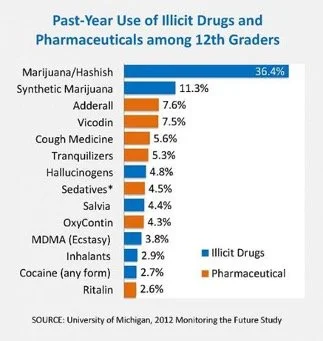Teens & Substances: When Our Worst Fears Come True
Photo by Jeferson Gomes on Unsplash
Ask any group of parents about their fears for their teenager and you will get a zillion different responses. There are plenty of things to worry about when it comes to teens (we earn these gray hairs, afterall). Out of the long list of issues parents worry about, substance abuse is certainly in the top five. Some parents may worry a lot about their teen’s drug and alcohol use, while others tend to think about substance use as a rite of passage, and as a result may be less concerned about it. Regardless of where we stand on the topic, it can be helpful to understand more about substance use so we can be proactive and compassionate with kids who may be struggling.
Facts About Teen Substance Abuse
Ten million people between the ages of 12 and 29 need treatment for substance abuse. Understanding drug and alcohol use patterns in teens is important because most people who later struggle with addiction start at a young age, some as young as 12 or 13 years old.
Figure 1 Graphic from National Institute of Health
The graphic above shows varying types of street drugs teens typically abuse, but the number one substance teens access is alcohol. One study shows that an alarming 4.3 million youth report binge drinking within the past month.
Often, we feel at a loss as to how to protect our kids from the detrimental effects of substances. We hear stories about teen overdose deaths, sexual assaults that are committed during intoxication, car accidents, legal involvement and so on.
Why Teens Use Substances
It is important to remember teens use substances for many different reasons, just as adults do. Often teens start to use drugs and alcohol to fit in with peers, but sometimes there are more complex reasons for continued use that involve self-medication for underlying mental health challenges.
Depression: Teens sometimes turn to substances to mask symptoms of depression. Even if your teen isn’t saying so, he may be feeling hopeless, numb or disconnected. Depression can manifest in surprising ways, such as changes in sleep and eating patterns, and loss of interest in usual activities. When teens turn to substances during periods of depression, it puts them at even greater risk for impulsive decision making, including suicide attempts.
Anxiety: Kids are under so much pressure. School work, social pressures (and probably lots of other issues adults have no clue about) create an environment of anxiety that can lead to an urge to escape with substances. When teens learn to use alcohol or drugs to reduce anxiety, it decreases their ability to cope with feelings while sober, making it even more difficult to face challenges in daily life that cause stress.
Social anxiety: Teen years are filled with self-evaluation and self-comparison. Kids who struggle with social anxiety experience this even more deeply and are at risk for using substances as a method of coping. Using substances to deal with social anxiety may reduce the immediate discomfort, but it doesn’t treat the underlying issue, and in fact, makes it even more challenging to face social situations without self-medication as time goes on.
Trauma: Teens who have experienced trauma are at significant risk when it comes to self-medicating with drugs and alcohol. Trauma symptoms that are masked with substances do not go away, and often become worse.
How Substances Exacerbate Symptoms
When teens use marijuana, Xanax and other street drugs, the detrimental effects extend beyond just the period of time they are intoxicated. Teens who learn to cope with emotions through using substances can develop habits of use that may seem harmless to them initially, but these habits become patterns with lasting implications.
Drugs and alcohol impact brain development in teens and increases the likelihood of other dangerous behaviors that can put them in harm’s way (driving while intoxicated, unprotected sex, impulsive risk-taking).
We can’t drink or drug away a feeling, and when we try, the thoughts and feelings that drove us to escape are still waiting. Then, instead of having one problem (depression, anxiety, trauma) we have two. Teens with mental health and substance abuse issues often encounter this cyclical pattern. The use of substances to mask mental health challenges ends up acting as a revolving door from which there is no easy escape.
Emotional pain feeds into substance use, which exacerbates the pain, which contributes to more substance use. It is a heartbreaking cycle that may look, on the surface, like a defiant teen who just wants to party.
How Parents Can Help
Parents can end up feeling hopeless and helpless when it comes to their teen’s substance use. Remember, you are not alone, and it is ok to feel this way. Try not to judge your thoughts and feelings about the situation and be patient with yourself as you navigate this journey with your teen.
Educate yourself. Learn as much as you can about teen substance use so you can know what to look for with her behaviors.
Feel the feels. Accept your feelings; all of them. You’re going to be angry, sad, resentful. It is normal to experience a range of emotion. Fighting off your emotions will not make them go away. Find ways to treat yourself well and accept all of those emotions that rise up.
Offer love and compassion. At the end of the day, you love your kid, even when they are making bad choices. Express your love, even if your teen actively rejects your efforts, it is seeping in and they need it so much, especially if they are struggling with substance abuse.
Ask tough questions. It might be tempting to turn a blind eye to your teen’s substance use, but in doing this it establishes a precedent of avoidance that distance you from one another. Ask about their substance use, how much they use and who they use with. Ask why they are drinking or using drugs, not in an accusatory way, but in an effort to understand. Those difficult questions could lead to a conversation that may save your teen’s life.
Set limits and stick to them. If your teen is using substances, it may feel increasingly difficult to know how to set and enforce limits. In spite of what they might say, teens need those external boundaries to be set. Developmentally, teens are not yet capable of recognizing where they should be setting limits for safety and your role is more important than ever to help keep them safe.
Join a parent support group. You need support too. Parenting a teen who is abusing substances is extremely difficult and you shouldn’t try to deal with it all on your own. Whether you join an online support group or a group within your community, access support for yourself. Remember the analogy; you can’t give water from an empty vessel. Support from other parents in a similar situation can help you replenish your energy reserves.
Reach out for support for your teen. Teens who use substances may seem reluctant to participate in counseling, but don’t allow that to deter you from establishing treatment options. Even the most reluctant teens, when presented with the opportunity to talk to someone about their challenges, are willing to participate once the appointment is made.
Never give up. That’s the most important thing to remember in all of this. There is always hope for recovery, and the best gift you can give your teen is to be aware of their struggle and to offer guidance toward healing.
Talley Webb, M.A., CRMC
Journey to Better, LLC




